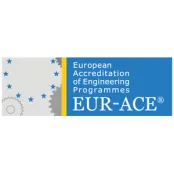The newsletter is your guide to what's happening on LUT campuses and the student community as well as to bachelor's and master's programmes updates and admission instructions. Newsletters will be delivered to your email once a month.


The programme is accredited by international EUR-ACE® and ASIIN standards for high quality degree programmes in engineering.
The availability and stability of the electricity supply are global concerns in the continuing rise of energy production and consumption. Electrical energy is recognised as the primary energy source to tackle global energy challenges. It is the key driver of efficiency and success in the energy transition towards a sustainable economy.
Electrical engineering stands as the largest and most diverse technological field in the world. Studies in the Master's Programme in Electrical Engineering are wide-ranging and highly relevant to society and industry. You may choose to specialise in the design, use and control of electric systems or in electronics.
You will acquire extensive knowledge of industrial operations as well as engineering skills and technological knowledge needed to design, assess and enhance electrical systems. You will also develop knowledge, skills and capabilities for intellectual, creative, responsive and professional growth, and lifelong learning for continuous improvement.
Admissions guide 2026
What will you learn in the programme?
In the programme, you will learn to apply the essential theories of electrical engineering to practical electrotechnical and electronics applications. You will be able to work independently and scientifically, acquire information, and formulate solutions to complex problems and tasks.
Further, you will learn to work as a member of a team and be able to organise, carry out, and lead projects. The degree programme also prepares you for scientific doctoral studies.
Degree structure and studies
The Master's Programme in Electrical Engineering is a two-year programme. It leads to the degree of Master of Science in Technology, M.Sc. (Tech.), which is 120 ECTS credits.
The programme includes core, advanced specialisation, minor and elective studies as well as a master's thesis. Read more in this academic year’s curriculum.
The fields of specialisation you can choose from are Electrical Drives; Control, Communication and Automation; or Electronics. Additionally, you complement your studies with one of the minors provided by LUT, for example, energy economics, business studies, software engineering, or Finnish language and culture.
In Electronics, you combine knowledge, skills and creativity when applying the circuits and components you have learned about in theory to electronics devices you make yourself. Electronics design is multidisciplinary, and in addition to electrical engineering know-how, you must take into account the enclosure, interference protection, thermal management and control software. As the electronics industry continues to expand to household appliances like lamps and toasters, you have the opportunity to contribute to its future.
Electrical Drives and Power Electronics combines electrical motors, their electronic control systems, and the conversion and control of electrical energy in various devices and systems. In this field of specialisation, you learn to master the required movement and force of electrical machines in different applications, such as industrial motors, elevators, and electric vehicles.
Control, Communication and Automation focuses on how to apply control engineering to get electrotechnical systems to behave as desired – reliably, economically and regardless of the environmental disturbances – and further, how to control devices using automation and processors. Additionally, the studies concentrate on planning and implementing embedded systems that consist of a device and software that controls it. The planning, implementation and efficient use of wireless data transmission solutions in various electrotechnical applications will also become familiar.
Double degree opportunity for LUT degree students
The programme also offers a possibility for double degree studies. Students admitted to the Master's Programme in Electrical Engineering at LUT may apply to the double degree programme organised in cooperation with the partner universities Leibniz-University Hannover (Germany) and Wroclaw University of Science and Technology (Poland).
Quality of education
The high quality of education is one of the most important principles on which we will not compromise. International programme accreditations ensure the continuous development of our education and the international recognition of the degrees of our graduates. LUT University was one of the world’s top 300 universities in the autumn 2023 THE World University Rankings, which is one of the most highly regarded university ranking systems.
The systematic quality assurance procedures that we have developed over a long period guarantee the high quality of our degree programmes and the strong competence of our graduates in the future labour market. The underpinning elements of our education quality are the contents of our degree programmes, which are based on innovations of scientific research and the needs of the working world, and active student–teacher interaction. We evaluate the quality of our education through several follow-up procedures and feedback channels (e.g., course feedback, graduate feedback, alumni feedback, thesis commissioners’ feedback).
Career prospects
The world is full of possibilities for a specialist in electrical and electronics engineering. Whether you are interested in product development, research, technical sales, marketing, entrepreneurship, or education, there will be plenty of interesting and challenging tasks for you.
LUT's electrical engineering training has been the launching pad for a number of important actors and growing companies in the field, some of which are based in Lappeenranta. Job opportunities are available in large international corporations as well as small and medium-sized companies in the field.
You will also have a firm basis for scientific doctoral studies in the field of your specialisation studies.
Contact Admissions Services
The LUT Admissions Services are here to assist you in all matters related to applying to international bachelor's and master's programmes.
For questions about admission criteria or entry requirements, please reach out to us by email: admission@lut.fi.
Chat with our students
Do you want to know more about studying at LUT, student life, or housing on LUT's campuses?
For questions about admission to bachelor's or master's degree studies, please email admission@lut.fi.




